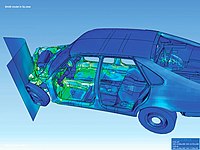
Photo from wikipedia
Received signal strength indicator (RSSI) gives a rough initial measure of the inter-node distances at low cost without the need of additional equipment or complexity. This necessitates the need for… Click to show full abstract
Received signal strength indicator (RSSI) gives a rough initial measure of the inter-node distances at low cost without the need of additional equipment or complexity. This necessitates the need for a mechanism to obtain accurate node locations from the noisy RSSI distance estimates. In this paper, a non-linear manifold learning technique, adaptive locally linear embedding (ALLE), is proposed for node localization using the noisy RSSI distance estimates. ALLE, a modified version of LLE, considers the neighborhood around a node to determine the neighbors to approximate the node optimally. Experimental and simulation results show that ALLE is able to localize the nodes accurately in both clustered and centralized wireless sensor network. The centralized mechanism is found to have higher accuracy as compared with ALLE running on different cluster heads. However, this increase in accuracy is at the cost of significant energy overhead required for information gathering at the base station. Results also indicate that the ALLE is able to localize sensor nodes with an increased accuracy of around 9.38% as compared with native LLE.
Journal Title: IEEE Sensors Journal
Year Published: 2017
Link to full text (if available)
Share on Social Media: Sign Up to like & get
recommendations!